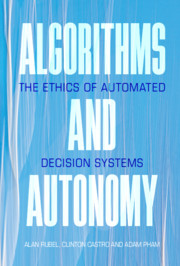Acknowledgments
We are enormously grateful for the people, audiences, and institutions that have provided support, feedback, discussion, advice, and criticism along the way. Thanks in particular to Richard Warner, Rob Streiffer, Filippo Santoni De Sio, Sven Nyholm, Ken Fleischmann, Eric Meyers, Bernadette Baker, Marc Alfano, Owen King, Nicole Nelson, Noah Weeth Feinstein, Suresh Venkatasubramanian, Tijn Borghuis, Holly Robbins, Catherine Crump, Helen Nissenbaum, Philip Nickel, Guy Axtell, Amiel Bernal, Adam Moore, Bryce Newell, Jeroen van den Hoven, Jean François Blanchette, Jens-Erik Mai, Kris Unsworth, Ellen LeClere, Anita Mukherjee, Mariah A. Knowles Knowles, Barbara Alvarez, Zhiyan Chen, Kristen Maples, Philip Romero-Masters, Xerxes Minocher, Nikita Shepard, Jerome Hodges, David Grant Gray, Milo Phillips-Brown, and Macy Salzberger.
There are a number of audiences that have provided a place for us to present and receive feedback on earlier versions of our arguments. These include the BIAS Workshop at the iConference at the University of Sheffield; the University of Texas Information School; the Information Ethics Roundtable at the University of Copenhagen; the Amsterdam Privacy Conference; the Computer, Privacy, & Data Protection Conference; the Privacy Law Scholars Conference; the Zicklin Normative Business Ethics Workshop at the Wharton School, University of Pennsylvania; the Eindhoven University of Technology Philosophy Department; the University of Twente Philosophy Department; the Department of Values, Technology & Innovation at Delft University of Technology; the Society for Philosophy and Technology; the Holtz Center for Science, Technology & Society at University of Wisconsin-Madison; the Risk and Insurance Department at UW-Madison Business School; the Bowling Green Philosophy Department; the University of California, San Diego, Philosophy Department; and the Jain Family Institute.
Alan would like to thank the Information School, the Center for Law, Society & Justice, and the Department of Medical History & Bioethics for being wonderful scholarly, educational communities. He would particularly like to thank the members of the 4TU Centre for Ethics & Technology in the Netherlands and the Faculty of Technology, Policy and Management at Delft University of Technology, where he was a visiting scholar in 2018–19. It was wonderful to spend an academic year around so many people doing outstanding work across philosophy, technology, ethics, and policy. Thanks especially to Tijn Borghuis, Ibo van de Poel, Sabine Roeser, and Nathalie van den Heuvel for facilitating the visit and helping make it a fruitful year. He’d also like to thank several people who have been enormously helpful along the way. Claudia Card was an outstanding dissertation advisor, mentor, and friend, and he misses her dearly. Thanks also to Ann Walsh Bradley. The fact that she authored the Loomis opinion doesn’t affect our analysis here, but her mentorship and example has made his work better in every way. Thanks coauthors Clinton and Adam for the hard work and careful thinking. He is grateful to his family, Peggy and Paul Rubel, Louise Rubel, and Fred Dikeman, for love and patience. And most of all thanks to Kristin Eschenfelder, for everything.
Clinton would like to thank the Departments of Philosophy at Florida International University and University of Wisconsin-Madison – as well as the universities themselves – for supporting his work on this book. He’d like to thank Michael Titelbaum, Sarah Paul, Alan Sidelle, Wayne Wright, and Nellie Wieland for being such excellent teachers. He’d like to thank the McNair Scholars Program, without which he would not have become a professional philosopher. He’d like to thank Alan and Adam for their hard work on this project. Most of all, he’d like to thank Molly and Ray for their love and support.
Adam would like to thank the Division of Humanities and Social Sciences at the California Institute of Technology, as well as the Department of Philosophy at University of Wisconsin-Madison, for supporting his work on this book. He owes special acknowledgments to Dan Hausman and Harry Brighouse, who have been special sources of philosophical guidance and support over the years. He would also like to thank his coauthors, Alan and Clinton, for their diligent work. For all other support, emotional and practical, he owes everything to Emma Prendergast.
We have been able to publish this book Open Access thanks to Sarah M. Pritchard’s continued, generous support to the University of Wisconsin Information School and her enthusiasm for making scholarly publications accessible. Thank you! We also wish to thank the University of Wisconsin’s Alumni Research Foundation for their financial support of the project.
Some of the material in the book is based on work we have published elsewhere. The rudiments of the arguments in Chapters 3, 4, and 7 first appeared in “Algorithms, Agency, and Respect for Persons,” Social Theory & Practice 46, no. 3 (July 2020): 547–572. The ideas in Chapter 7 saw light as a conference paper (“Agency Laundering and Algorithmic Decision Systems,” in Information in Contemporary Society (Lecture Notes in Computer Science) (Proceedings of the 2019 iConference), edited by N. Taylor, C. Christian-Lamb, M. Martin, and B. Nardi, 590–598. Springer Nature, 2019). We later developed those preliminary thoughts into the article that is in large part reproduced as Chapter 7 here: “Agency Laundering and Information Technologies,” Ethical Theory & Moral Practice 22, no. 4 (August 2019): 1017–1041. The book chapter “Epistemic Paternalism Online” (in Epistemic Paternalism Reconsidered: Conceptions, Justifications and Implications, edited by Guy Axtell and Amiel Bernal [Rowman & Littlefield, 2020]) was a launching point for Chapter 6. However, Chapter 6 contains little of the same content and instead begins where the earlier work leaves off.



